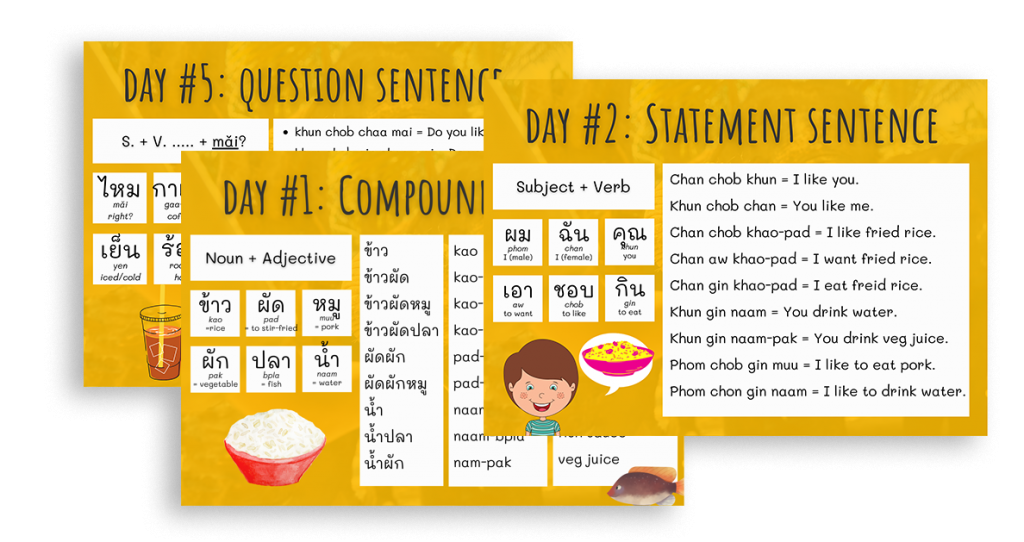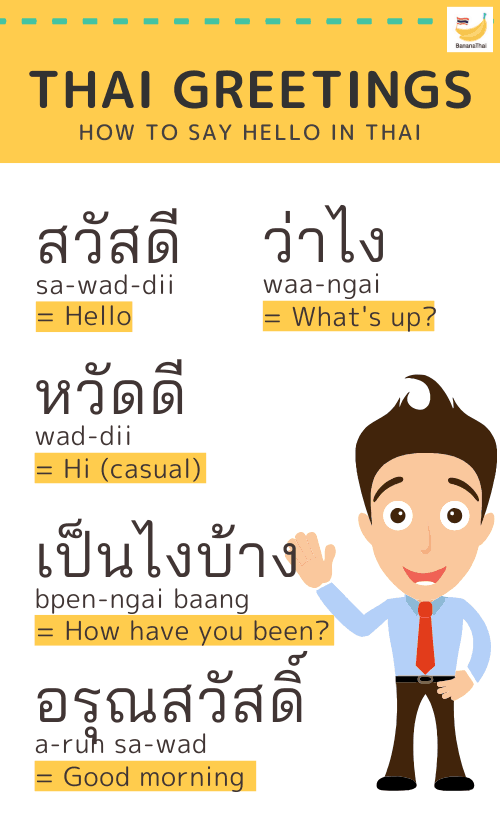If you visit Thailand for the first time, you must be curious about how to say ‘hello’ in Thai and how to greet Thai people.
Do Thai shake hands like American, kiss on cheeks like French or rubbing noses together like Eskimo?
This post will guide you on how to greet like a local Thai as well as how to say ‘hello’ in a proper manner in different situations
Overview
Hello in Thai
The phrase ‘hello’ in Thai is สวัสดี /sawaddii/ which literally means peace, goodness, and beauty according to Sanskrit.
One interesting thing is that this ‘sawaddii’ (สวัสดี) phrase was officially announced to use commonly by Field Marshal Plaek Phibunsongkhram in 1943 (less than 100 years ago)
Sawaddii ka/krab
Thai people mostly say ‘sawaddii’ with polite particles: ค่ะ kà and ครับ kráb
In which each particle is used in different situations:
- kà ค่ะ is used by a female speaker
- krab ครับ is used by a male speaker
Many foreigners misunderstood that it’s about who you are talking to in which it’s wrong. It only matters about the gender of the speaker.
When to use sawaddii
- As a greeting word: when meeting someone. It is the most common way to greet at any time of the day.
- As ‘goodbye’ at the end of a conversation and a phone call: sawaddii (สวัสดี) could be used as ‘goodbye’ in a polite and formal way (not commonly used with friends)
Good morning in Thai
Honestly, we normally use ‘sawaddii’ at any time of the day. It doesn’t matter whether it’s in the morning, afternoon or evening, you can always use ‘sawaddii’ to greet.
However, there are still some phrases that are quite common as ‘Good morning or Goodnight’. Please take a look at the phrases below:
- อรุณสวัสดิ์ /a-run sawad/
= Good morning (used in a writing term) - ราตรีสวัสดิ์ /raa-dtrii-sawad/
= Good night. It is commonly used as a goodbye before going to bed rather than to greet.
Please note that Thai people do not say ‘Good afternoon or Good evening’ in a modern age anymore.

Join 5-day Easy Thai challenge
Get a series of short lessons via email to master basic Thai sentences. Best for beginners.
Alternative phrases to greet in Thai
If you want to level up your Thai a bit and want to know other cool phrases or slang Thai people use to greet, please take a look at the phrases below with examples to use them properly.

- หวัดดี /wad-dii/
= Hi!
It’s a very casual way of sawaddii as it’s shortened. Again, you can use with particle ka and krab- หวัดดีค่ะ /wad-dii ka/
- หวัดดีครับ /wad-dii krab/
- ว่าไง /wáa-ngai/
= What’s up? - สบายดีไหม /sa-bai-dii mai/
= How are you? - เป็นอย่างไรบ้าง /bpen yàang-rai báang/
= How is it going?
You use this phrase when you have not met this person for a while - เป็นไงบ้าง /bpen ngai báang/
= How is it going? (shortened version) - กินข้าวหรือยัง /gin-khao rue-yang/
= Have you eaten yet?
Honestly, you will hear this all the time, especially with a Thai family. My mom always asks me this question twice a day.
การไหว้ wai (palms together)
Do Thai people shake hands or kisses?
It is a big NO! to hug or kiss Thai people when meeting the first time (or anytime). You might make us feel uncomfortable, instead we ‘wai’ไหว้ (putting palms together) as we normally greet. It is because Thai society is based on Buddhism, both being humble and respect seniority are some of the main values of Thai society. There are 3 levels of traditional ‘wai’ regarding 3 levels of age and social status:
It is because Thai society is based on Buddhism, both being humble and respect seniority are some of the main values of Thai society. There are 3 levels of traditional ‘wai’ regarding 3 levels of age and social status:
1. To pay respect to Buddha, monks or sacred places
You would put your palms together. Your thumps are in between your eyebrows and you should bend forward.

2. To pay respect to a senior, boss, your parents, teachers or anyone older than you
You would put your palms together. Your thumps are at the tip of your nose and you should bend forward.

3. To pay respect to your colleagues or anyone who is a bit older than you.
You would put your palms together. Your thumps are positioned at your chin level and you should bend a bit forward.

In the present day, wai still exists and quite common in Thai society even though the 3 levels are sometimes mixed up. You can still see news reporters do the ‘wai’ while saying ‘sawaddii’ at the beginning and the end of the TV program.
To greet Thai friends

If you’re comfortable calling someone a friend and they are at a similar age, you can wai at the chest level or don’t even have to the ‘wai’ anymore when greeting people nowadays. You can just say ‘sawaddii’ or ‘waddii’ with a nice smile. That’s already enough. Your friends might feel uncomfortable if you ‘wai’ them.
Summary
It’s quite simple to properly greet with Thai people. Put a big smile on your face while saying ‘sawaddii’ in which you can use this word at any time of the day.
Do not kiss, hug people for the first time especially Thai seniors who are conservative. I would suggest you ‘wai’ them in a Thai traditional way.
If you meet Thai who is less conservative or live in international communities like someone living in Bangkok, or has studied abroad. This is an exception.
For example, I brought many foreign friends to my hometown and meet my family. My mom was still just doing the wai and smile, instead of hugging while my dad is a bit more open to shaking hands.



